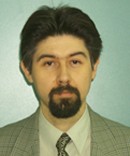

Plenary Lecture
Lessons Learnt on Industrial Ecology as an Optimization Mechanism within the Multi-Dimensional Domain of Sustainable Development, Energy/Materials Saving and Environmental Preservation

Associate Professor Dimitris Sidiras
co-author F. Batzias
Laboratory of Simulation of Industrial Processes
Department of Industrial Management and Technology
University of Piraeus
Greece
E-mail: sidiras@unipi.gr
Abstract: Industrial Ecology is a systemic/multidisciplinary discourse dedicated to the optimization of energy and material flows through an industrial domain, mapped as a network of processes that extract/modify natural resources, thus interconnected with the environment, where residues/wastes are also discharged. This optimization is examined in the present work by using energy/materials saving (E/M) and sustainable development (S) as main factors. In an attempt to investigate the relation between these factors, we set S as the dependent variable (output) and a composite index I, based on the weighted combination of E and M, as the independent variable (input). The optimal value Iopt is found at the minimum value Smin of the objective function S(I), which consists of two conflict variables S1 and S2, based on the beneficial action of energy/materials saving and the flexibility decrease (due to sacrifice of degrees of freedom to obtain higher I-values, implying also higher compactness of the industrial processes network), respectively. Since the demand for energy/materials depends also on the level of S, which is changing in the time course, we should deal with an implicit function of the form f (S, E, M) = 0 rather than with an explicit function of the form S = f (E,M). Therefore, we can obtain an internal triangular relation between S, E, M, having a gravity center near the variable playing the most significant role. Nevertheless, we can reduce the generalized implicit function to its corresponding explicit form by setting the variable to be interconnected mostly with the strategic task as the depended one. Three case examples are presented to illustrate real situations, where S, E, M, correspond to a strategic target set a priori, respectively.
Brief Biography of the Speaker: a) Studies: Diploma, Chemical Engineer, Department of Chemical Engineering, National Technical University of Athens, 1984. Doctor of Engineering (Ph.D.), Department of Chemical Engineering, National Technical University of Athens, 1990
b) Academic Positions: Associate Professor, Department of Industrial Management & Technology, University of Piraeus, Piraeus, Greece
c) Scientific Activities (research, publications, projects, etc….): Research interests include: experimental and computational simulation of industrial/chemical processes; economo-technical analysis of industrial branches/organic chemical industry; renewable energy sources; biomass; natural resources management; GIS based management; environmental management; manufacturing of agricultural product/byproducts; teaching methodology; distance learning. 17 publications in ISI journals, and 80 in conference proceedings (after peer-review), with 263 citations and an h-index of 10 (source: ISI Web of Science, Thompson Scientific; self-citations excluded). I participate continuously since 1989 in the European Biomass Conferences and published more than 26 papers in their proceedings, while recently I joined the conference’s scientific committee.
d) WSEAS Activities (papers, sessions, organization of sessions, organization of conferences, books, special issues in the journals etc… within WSEAS):
1. Fragiskos Batzias, Dorothea Politi, Dimitris Sidiras, Heavy Metals Pollution Abatement within a Framework of Industrial Ecology. Recent Advances in Fluid Mechanics and Heat & Mass Transfer. 9th IASME/WSEAS International Conference on Heat Transfer, Thermal Engineering and Environment (HTE '11). Florence, Italy, August 23-25, 2011pp. 251-256.
2. Sidiras, D., Bountri, A., Konstantinou, I., Batzias, F. On the validity of the Law of diminishing returns in packed bed columns used for wastewater treatment. Recent Researches in Energy and Environment. 6th IASME/WSEAS International Conference on Energy and Environment, EE'11, Cambridge, UK, February 23-25, 2011, pp. 160-165.
3. D. Sidiras, A. Bountri, F. Batzias Modeling an Adsorption Column for Wastewater Treatment by Using Dimensionless Groups in Scale-Up Procedure. Advances in Biology, Bioengineering and Environment. Proc. 8th WSEAS International Conference on Environment, Ecosystems and Development (EED '10)” Vouliagmeni, Athens, Greece, December 29-31, 2010. pp. 234-239.
4. D. Sidiras, F. Batzias, I. Konstantinou, M. Tsapatsis, Development of a New Oil Spill Adsorbent from Autohydrolysis Modified Lignocellulosic Waste Material, Recent Researches in Chemistry, Biology, Environment and Culture, 9th WSEAS Int. Conf. on Environment, Ecosystems And Development (EED '11). Montreux, Switzerland, December 29-31, 2011, pp. 163-168.
5. S. Zervopoulou, D. Sidiras, F. Batzias, Modeling sedimentation in seawater after an oil spill dispersion, Recent Researches in Chemistry, Biology, Environment and Culture, 9th WSEAS Int. Conf. on Environment, Ecosystems And Development (EED '11). Montreux, Switzerland, December 29-31, 2011, pp. 169-174.